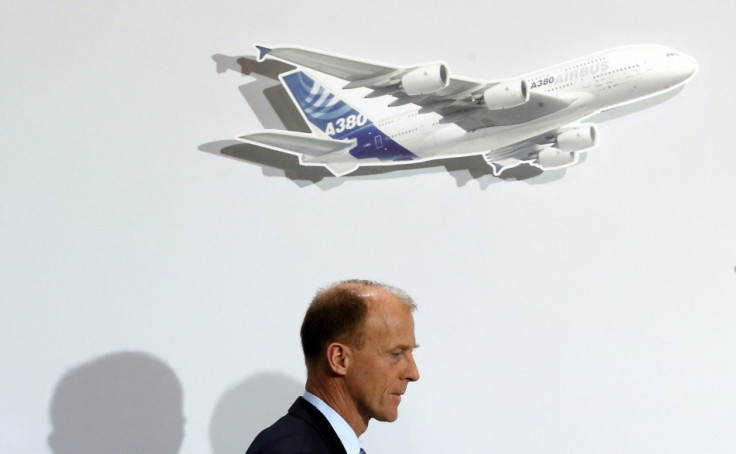Airbus Parent EADS's Profit up 19% on Record Aircraft Deliveries
Airbus order backlog equals eight years of production

Pan European defence major EADS has reported a strong profit growth for 2012 as its revenues received a boost from the aircraft manufacturing division Airbus.
The Airbus owner recorded a 19 percent increase in full-year net profit to €1.23bn ($1.61bn, £1.06bn). Adjusted earnings before interest and taxes (EBIT), a key indicator of the company's performance, rose to €3.0bn from €1.8bn last year.
Yearly revenues rose 15 percent to €56.48bn, with revenues at Airbus rising by 17 percent to €38.59bn. Airbus achieved record deliveries in 2012, handing over a total 588 aeroplanes to customers, including 30 A380 superjumbos.
Following the strong results, the company raised its planned dividend payout to €0.60 from €0.45. EADS shares are trading at €36.74, up 5.36 percent, as at 5:17 am EST on the Paris Stock Exchange.
In 2012, the company accepted orders worth €102.5bn, taking its order book to €566.5bn at the end of the year.
"A strong focus on deliveries helped to significantly improve cash generation during the fourth quarter," EADS CEO Tom Enders said in a statement.
Looking ahead, the company said it is focusing on improving the bottom line, but noted that there is "still some way to go to meet our profitability targets".
For 2013, EADS projects to record an adjusted EBIT of €3.5bn on "moderate growth" in revenues, which will be held back by fewer deliveries of A380 superjumbos.
The aerospace giant has been trying hard to increase its aircraft deliveries like its US rival Boeing. Airbus's A320 family and Boeing's 737 series attracted strong demand from airlines due to fuel efficiency and design. Airbus currently has a huge order backlog, representing eight years of production.
EADS, which employs 140,000 people, expects gross commercial aircraft orders in the range of 700. Meanwhile, Airbus deliveries are expected to grow to between 600 and 610 commercial aircraft.
Further, the company warned that the Airbus A350 XWB passenger jet programme "remains challenging". The model suffered delays on its entry into commercial service, which is now scheduled for the second half of 2014.
Airbus earlier announced that it will not use the lithium-ion batteries for the A350, after apparent problems with the batteries resulted in the grounding of rival Boeing's entire fleet of 787 Dreamliner. Analysts noted that a switch to the traditional nickel-cadmium batteries could further delay the commercial launch of the A350.
© Copyright IBTimes 2025. All rights reserved.






















